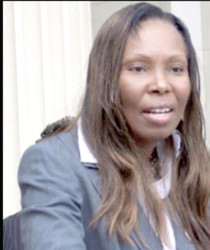Residents of large areas of south Georgetown enjoy the convenience of not having to travel to city markets to buy freshly caught, ready-to-cook fish. Situated virtually in their backyards is Global Seafoods processing plant where fish is cleaned, gutted and scaled, packaged according to approved environmental and handling requirements, and blast-frozen before distribution.
A portion of the produce which includes trout, Banga Mary, red and grey snapper, shark and prawns, go through another process in the value-added chain to make it pan-ready. It is seasoned with locally available condiments and packaged in fillet or nugget form. Yet another portion is filleted, de-boned, salted and dried then packaged for both local and overseas markets.

Proprietor Allison Butters-Grant, well known in business circles in Guyana and New Jersey, USA, told Stabroek Business that she and her spouse and business partner, Kerwin, have gone to considerable lengths to ensure that their 10-month-old facility remains compliant with national and international food processing and environmental standards. The preparation routine includes minimal human contact with the fish and compulsory chlorinated foot baths at the doors to the handling rooms, the delivery/loading bay and walk-in freezers.
The thousands of gallons of water used every day to wash the produce is also treated as is the effluent from the plant.
The suppressed smell of fresh fish that can only be detected from approximately 10 feet from the exterior doors attests to the effectiveness of the treatment procedures. Solid waste too poses no problems. All of it is taken away by pig rearers with farms as far away as West Demerara and West Berbice.
Butters-Grant explains that fish is purchased everyday directly from selected trawlers, a practise that explains the term ‘Wild-Caught’ emblazoned on the wax-coated box containers used for export packaging. This term, she says, differentiates her produce from fish reared in aquaculture farms.
The Global Seafoods branded products are also available in supermarkets in all three counties in Guyana, in the Caribbean diaspora and New Jersey, USA.
Butters-Grant runs the marketing, administrative and human resources side of the enterprise with an ease that is due to the fact that she grew up watching her parents manage their own fishing enterprise. Her husband holds responsibility for all operational procedures.
Prior to 1992, Butters-Grant’s parents had owned seven fibre-glass fishing and shrimping trawlers. Their catches were distributed at the wharves in Georgetown, and at the Mackenzie market at Linden. For many years their trawlers were the major source of fresh fish in the bauxite community. That came to an end just after 1992, when they were compelled to give up their business. Considerable numbers of people were left unemployed. Since then, Lindeners have been buying scarce fresh fish at high prices or acquiring fish on their trips to the city.
Butters-Grant is currently working out the modalities of taking her own tile at the Linden market.
There is, too, a philanthropic side to her character which she copied from her parents. Her plans to recommence working the Linden market are rooted in a need to serve a people who were good to her father and his business.
She had the good fortune of being sent to the United States in 1986 to pursue university education. Over the succeeding 25 years of living and working in corporate New Jersey, USA she immersed herself in societal politics and charities while she ran a successful fish processing plant and retail/wholesale distributorship. Her supplier in Guyana had been a trawler owner on the East Coast who subsequently closed his business. She shifted to other Guyanese suppliers but was dissatisfied with the quality of the fish they sent her.
Butters-Grant refused to lower the standards on which she had built her reputation so she decided to return to Guyana.
Her spouse, although a native Guyanese, was only 10 years old when his family migrated to the US so it took some convincing to secure his agreement to join her in this endeavour. “I asked nicely and he accepted after some convincing,” she quipped. Now her business is growing as is the public awareness of the high quality of the Global Seafoods branded products, seasoned and unseasoned, found on local, Caribbean and US supermarket shelves and in meat outlets.
Their two children, an accountant and a banker, are also integrally involved in Global Seafoods. From their New Jersey locations they take responsibility for networking among distributors and securing new markets in North America.
In the meantime, just like most local enterprises, Global Seafoods is battling the challenges of high electricity costs and inconsistent water quality. Over the 10 months of operation, the monthly electricity bills have climbed to just under $1 million. As if that were not enough the enterprise has had to invest in water purification systems. Butters-Grant’s biggest challenges though, comes from competitors who see her as an interloper in a male-dominated sector. She makes it clear, however, that these challenges do not interfere with her determination to grow. Her training at Cornell University, including her studies in good manufacturing practices has reinforced her appreciation of the value of her employees and the skills that they bring to her business. Global Seafoods, she says, has developed a reputation for being a good employer that cares about the welfare of its workers. The company contributes time, financial support and mentorship to those who seek vocational and tertiary education in a range of disciplines that include engineering and ICT.
Most of the company’s workers are female residents of the host community. Two employees have undergone the USAID-sponsored rehabilitative SKYE programme, a mentorship programme that also seeks to motivate people to upgrade their education and teaches them to manage their money through the practice of saving.
“As a woman, it is uplifting to be able to mentor young women, to give them opportunities they would not ordinarily have, and help them into a position for upward mobility,” Butters-Grant says.





